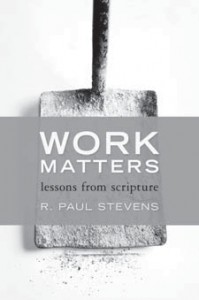
Work Matters: lessons from Scripture
by R. Paul Stevens
William B. Eerdmans Publishing Company, 2012
Paperback, 176 pp, £10.99
ISBN 978-0-8028-6696-7
Paul Stevens has worked as a carpenter, pastor, on the staff of IVCF, church planter and latterly as an academic. He has written and lectured internationally on the subject of ‘liberating the laity’ and relating work to the Scriptures for nearly three decades. Work Matters is a distillation of his wisdom on the subject gathered over these many years. It is a highly readable biblical theology of work arranged in an original manner.
In his book Stevens invites his reader to ‘discover a new work-view that can revolutionize not only our own work but the mission of the people of God in the world.’ It is written in bite-sized chapters of about eight pages each, making this a book the reader can put down and take up at convenient moments. The short chapters also encourage thoughtful and prayerful contemplation. They are grouped into five parts, each covering a part of the Bible – a genre of biblical literature – and describing a type of work. For example Part One, the Pentateuch, concerns ‘God-given work’, the historical books ‘stewardship work’ and other sections deal with ‘soul work’ (Wisdom literature), ‘just work’ (prophets) and ‘kingdom work’ (New Testament). This slightly idiosyncratic classification is symptomatic of Stevens’ style, which is unusual but always refreshing.
Within each part of the Bible, the chapters revolve around the story of a person. To each character Stevens gives a label to describe their work. For me the most intriguing examples were those relating to the wisdom literature, seemingly the most difficult books for this exercise. The author labels these types of work ‘wild work’ (Job), ‘slothful work’ (from Proverbs), ‘entrepreneurial work’ (the businesswoman of Proverbs 31) and ‘enigmatic work’ (the ‘Professor’ of Ecclesiastes). He draws an application from each story to modern-day work. In doing this Stevens seeks to ‘uphold the fundamental unity of Scripture’ (p.4). These stories, he writes, need to be read going forward in time since we are headed toward a future Garden- City, not back to the Garden in Eden. Stevens invites his readers to ‘discover a new workview that can revolutionize not only our own work but the mission of the people of God in the world.’ (p.6) This springs from his passionate belief that Jesus’ resurrection and the giving of the Spirit are guarantees of the ‘meaningfulness of matter and work’ and ‘proof-positive of a glorious future for creation and God’s people.’ (p.155)
Most chapters follow a common format. Each chapter is headed by a quotation. But as you read on you realise the argument sometimes runs counter to the sentiment of the quotation. For example the chapter on ‘Slothful Work’ begins with a quotation by Donald Trump who describes the workaholics he likes to hire. At other times you cannot be sure if Stevens agrees with the quotation. I think this is because Stevens wants us to think about the issues he’s raising.

Next Stevens narrates the story of a biblical character to describe their work, means of working and the consequences of their work. He has a talent for summing up the biblical narrative in a fresh way. Take this summary of Jonah as an example: God calls an angry man to share a message he hardly believes, with people he does not like, in order that the missionary himself might be saved!’ (p.126)
Then Stevens analyses the story’s implications. I like the ways that he not only sets out his diagnosis but we listen to others’ opinions as he introduces us to the literary friends and companions who have contributed to his own thinking. For example while analysing the ‘sluggard’ Stevens makes the point that whoever hires a sluggard acquires a ‘dead weight.’ How is the entrepreneur or manager to respond? In reaching a solution Stevens draws on Derek Kidner’s commentary, Richard Baxter’s ‘Practical Works’, St. Augustine and Kathleen Norris on acedia, Paul Jordan-Smith’s book on Seven (and more) Deadly Sins, as well as Dorothy Sayers.
Throughout the work are comments and quotations worth saving and cataloguing for future use. Here is one of my favourites. Stevens is passionate about refuting the false dichotomy between holy work done by the clergy and other work done by lay people, which he says was introduced by the first Christian historian, Eusebius. How might we overcome this problem? Follow George MacDonald’s advice in The Curate’s Awakening: “One very simple sifting rule [to avoid hiring self-seeking clergy] would be, that no one should be admitted to the clergy who had not first proved himself [sic] capable of making a better living in another calling”. Stevens concludes each short chapter with questions that make it suitable for individual reflection or group study. At the end of the chapters dealing with a particular genre he sums up the lessons he draws from that type of biblical literature.
Like the Bible itself there are tensions in this book that need to be resolved. They also reflect our common life experience. These tensions largely concern ‘good work’, a recurrent theme. On the one hand, ‘We are called to work as God does and that calling does not stop at sixty-five or some arbitrary retirement age.’ According to the creation covenant’ this requires that we commune with God, build community, and co-create with God (pp.18-20). Moreover since ‘the scope of redemption in Christ is the same as the scope of creation’ (p. 137) the character of good work is unchanged by the work of Christ. Furthermore, since ‘all creative work starts in the imagination’ (p. 114), good work begins in the mind’s eye ‘inspired by the goodness of God and directed to the pleasure of God’ (p. 19)? On the other hand, the author believe that ‘some people are doing the work of God’s realm without knowing God and without knowing that they are dong God’s work.’ (p.137)
Can we therefore have a ‘pick ‘n mix’ attitude to work: where good work need only fulfil some of the requirements of good work? Or is it simply the case that some work is better than others? Will some work simply last longer? Or does all work which is mostly good build on the ‘works that the virtues shape’? In the words of the Roman Catholic theologian, John Haughey, will it ‘contribute toward something of everlasting worth’?
Work Matters is a thoughtful and at times provocative book written in a fresh way that is well worth reading. Since it’s fairly short and full of distilled wisdom, I recommend reading it twice, as I did. The quotations, references and aphorism ensure you will continue to refer to it as you think about how your work matters.